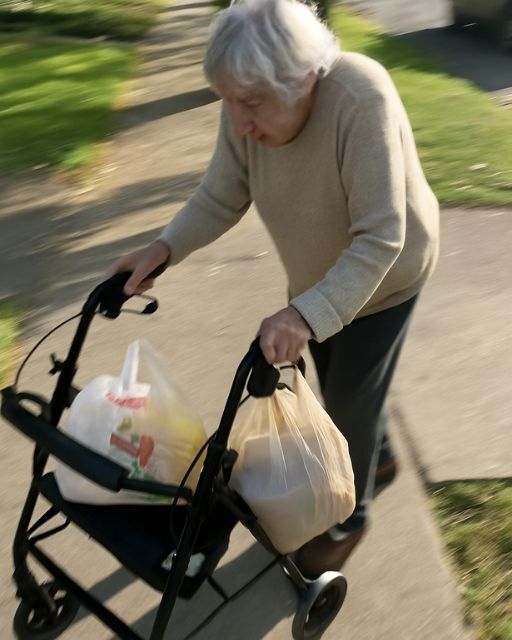I saw her moving slowly along the sidewalk around five o’clock, her walker creaking with every step. Two supermarket bags hung from its handles—one filled with a loaf of bread and cans, and the other containing something warm, wrapped in a towel and carefully packed in takeout boxes.
She didn’t notice me watching from across the street. Her focus was complete, her steps steady, as though this stretch of sidewalk was a task she would not fail to complete.
Miss Inez, I knew her. She lived a few houses down, always greeted the mailman with a wave like it was an important appointment, and kept her curtains wide open at all hours.
But today was different. She seemed tired, taking deep breaths as she went.
Still, she pressed on.
When I crossed the street to offer help, she smiled and waved kindly.
“I’m fine,” she reassured me. “I’m just bringing something hot to the Mitchell boy. His mother’s been sick, and he’s been home alone for the last few nights.”
She shifted the towel-wrapped bag, adjusting its position, and kept moving.
“I know how it feels,” she added softly. “To feel lost.”
That’s when I noticed the letter taped to the top of the container. Her handwriting was clear but shaky.
The front of the letter had two words:
“You are important.”
I offered to walk with her, and this time, she accepted. She stopped every few feet to catch her breath—not because she was weak, but it seemed like she was saving her energy for the most crucial part—the delivery.
After about ten minutes, we reached the Mitchell house. The paint was peeling, the curtains drawn, and there was no car in the driveway.
Miss Inez knocked gently with the side of her knuckle, twice. The door cracked open, revealing a boy—maybe twelve or thirteen. His eyes were tired, his hair unkempt.
Her voice was as warm as the soup she was carrying. “Evening, baby. I brought you dinner.”
He blinked, staring at the bag as though unsure if it was really for him. After a long pause, he slowly took it, handling it carefully, as if it might fall apart.
“My mom’s still in the hospital,” he mumbled. “They haven’t decided yet.”
Miss Inez nodded. “Then you need to eat. And remember…” She tapped the letter. “You are on someone’s mind.”
“Thank you,” the boy whispered as we turned to leave. But just before we walked away, he added something that hit me hard.
“It’s been three days since anyone knocked on our door.”
We took a slower walk back. I joked about swapping her walker for a bike and offered to carry it for her. She smiled.
“People think the small things don’t matter,” she said. “But sometimes, just a few kind words and a warm meal… it reminds someone they still matter in this world.”
The twist? Later that week, the boy’s mother returned from the hospital. Word spread quickly, and over the next few days, neighbors began leaving things outside their door—cooked meals, old comic books that their kids had outgrown, and even a handwritten card signed by three families on the block.
But what really stuck with me?
That note on the bag: “You are important.”
It was taped to the boy’s refrigerator.
And a few months later, when Miss Inez had a minor fall and needed help around the house, who was the first to show up every morning? The same boy, now with a fresh smile, carrying bags for Miss Inez instead of receiving them.
Here’s what I’ve learned: It doesn’t take much to change someone’s day or even their life. Just six blocks, a walker, a towel-wrapped dinner, and a reminder that you’re seen, that you matter.
If this story touched you, share it. Kindness isn’t about the size of the gesture—it’s about the heart behind it. And maybe you’ll be the one to knock when someone nearby needs reminding that they’re not alone.
